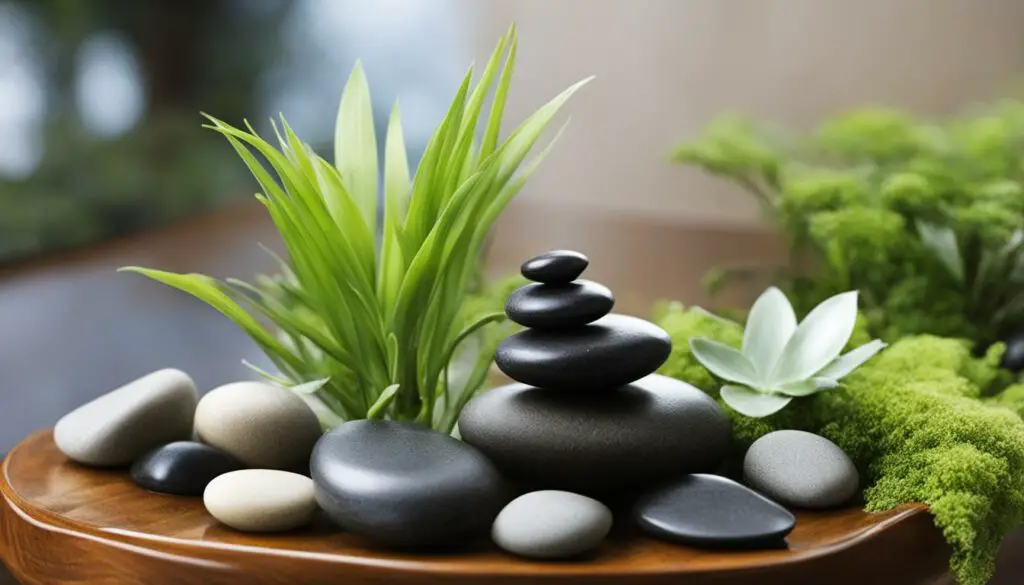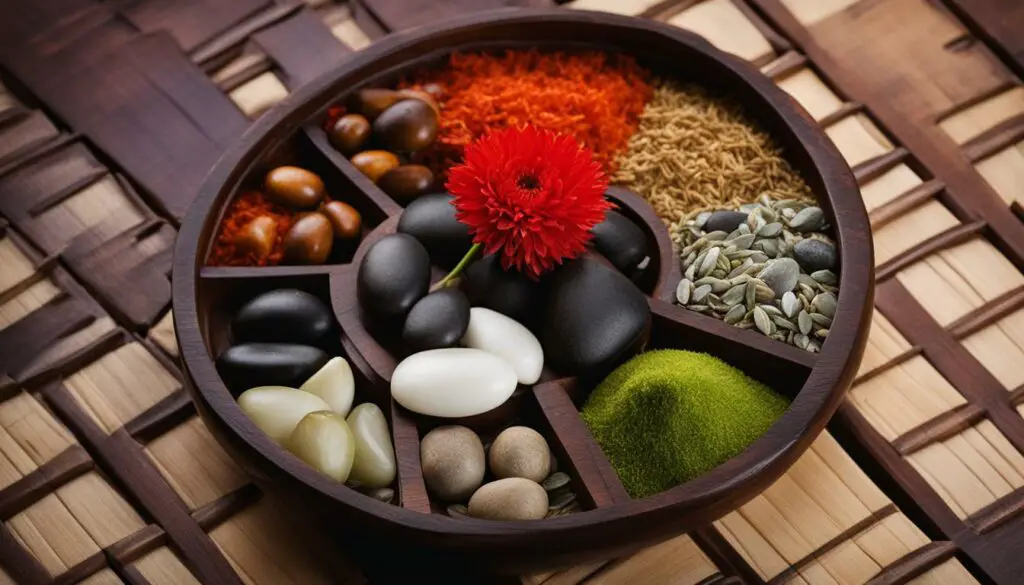Feng Shui, the ancient Chinese practice of arranging one’s environment to promote harmony and balance, has gained popularity in recent years as people seek to improve their homes and workplaces’ energy flow. But is feng shui based on scientific principles or mere superstition?
In this article, we will explore the origins of feng shui, its fundamental principles, and how it can be applied in your home or office. We will also delve into the debate of whether feng shui is grounded in science or simply a belief system. By the end of this article, you’ll have a better understanding of feng shui and what it means for you.
Key Takeaways:
- Feng shui is an ancient Chinese practice that involves arranging one’s environment to promote balance and harmony.
- There is a debate among experts and practitioners about whether feng shui is based on scientific principles or is a belief system.
- Understanding the principles of feng shui can help people create a more harmonious and balanced living and working environment.
- Applying feng shui principles to your home or office can help improve your well-being and productivity.
- While there is some scientific research exploring the validity of feng shui, more studies are needed to fully understand its effects.
The Origins of Feng Shui
Feng shui, which translates to “wind-water” in English, is an ancient Chinese practice that aims to create harmony and balance in one’s environment. At its core, feng shui is based on the belief that there is a flow of energy, or qi, that exists in everything and everyone and that this flow can be influenced by the arrangement of objects and furniture in a physical space.
The principles of feng shui are rooted in the idea that everything is interconnected, and that the arrangement of objects and furniture in a space can impact the quality of energy in that space. By incorporating feng shui techniques, practitioners believe that they can create a more welcoming and harmonious environment that promotes positive energy flow.
The Principles of Feng Shui
There are several key principles that guide the practice of feng shui:
- Bagua: The bagua is a feng shui tool used to map out the energy flow in a space. It is a grid divided into eight areas, each of which corresponds to a different aspect of life, such as love, health, and wealth.
- Five Elements: The five elements are wood, fire, earth, metal, and water. Each element is associated with a particular aspect of life and can be used to balance the energy in a space.
- Yin and Yang: Yin and yang are opposite forces that are believed to be present in everything. In feng shui, balancing these forces is essential for creating harmony and positive energy flow.
- Compass Directions: The compass is used in feng shui to determine the ideal placement of furniture and objects in a space based on their corresponding compass directions.
- Clutter Control: Clutter is believed to disrupt the flow of energy in a space, so keeping a tidy and organized environment is essential for maintaining positive energy flow.
Feng Shui Techniques
There are several techniques used in feng shui to promote positive energy flow:
| Technique | Description |
|---|---|
| De-Cluttering | Getting rid of unnecessary items to create a more organized environment. |
| Adding Plants | Plants are believed to promote positive energy flow and can be used to create a more natural and calming environment. |
| Using Mirrors | Placing mirrors strategically in a space can help to reflect light and energy, creating a brighter and more lively environment. |
| Choosing Colors | Colors are believed to have different energetic properties, so choosing the right colors for a space is essential for promoting positive energy flow. |
| Arranging Furniture | The arrangement of furniture in a space can impact the flow of energy, so feng shui techniques focus on creating a balanced and harmonious arrangement. |
Understanding the principles and techniques of feng shui can help individuals create a more harmonious environment in their homes and workspaces, promoting positive energy flow and a sense of well-being.

Debunking Feng Shui Myths
Feng shui has been the subject of many myths and misconceptions, causing some to view it as mere superstition. Let’s explore some of these myths and debunk them to gain a more accurate understanding of feng shui.
MYTH: Feng shui only involves rearranging furniture.
This is a common misconception that misses the depth and complexity of feng shui. While furniture placement is a key aspect, it is only a part of the practice, which also involves the use of color, natural elements, and other techniques to create balance and harmony in one’s environment.
MYTH: Feng shui always requires extensive renovations.
While major renovations may be necessary in some cases, feng shui can also be implemented through simple adjustments and additions. For example, adding plants or using specific colors can have a significant impact on the energy flow of a space.
MYTH: Feng shui is a form of magic or mysticism.
Feng shui is often associated with mysticism or spiritualism, but its principles are based on the natural flow of energy and the effects of environmental factors on human well-being. While intuitive guidance may play a role in feng shui, it is not reliant on any magical or supernatural forces.
MYTH: Feng shui only applies to homes and residential spaces.
Feng shui can be applied to any type of environment, including offices, businesses, and public spaces. The principles of feng shui can be used to create a harmonious and productive work environment, leading to improved performance and increased success.
MYTH: Feng shui only appeals to a certain demographic.
Feng shui has evolved to become a practice embraced by people of diverse backgrounds and beliefs. While it has roots in Asian culture, feng shui has gained popularity worldwide and is viewed as a useful tool for improving one’s surroundings and well-being.

By debunking these myths, we can gain a better understanding of the true principles and benefits of feng shui. The practice offers practical techniques for creating a more harmonious environment and positively impacting personal well-being, regardless of any myths or preconceived notions.
Scientific Approach to Feng Shui
While feng shui is often viewed as a traditional Chinese belief system, there is also a scientific approach to the practice. Evidence-based feng shui incorporates principles of physics and environmental psychology to explain how the arrangement of objects and structures in a space can affect energy flow and human behavior.
One study conducted by the Harvard School of Public Health found a correlation between indoor pollutants and negative health effects, supporting the belief that a clean and well-ventilated space can promote better physical well-being. Additionally, research has shown that exposure to natural light can improve mood and productivity, indicating that arranging furniture and objects to allow for maximum natural light can have a positive impact on mental well-being.
Another scientific approach to feng shui involves the use of magnetometers to measure the energy fields in a space. It is believed that these fields can be manipulated through the strategic placement of objects to enhance positive energy flow.
However, it is important to note that while evidence-based feng shui may provide some validity to the practice, there is still much debate surrounding its scientific credibility. Critics argue that the studies conducted thus far have been limited in scope and do not provide sufficient evidence to support the more mystical aspects of feng shui. Nevertheless, the scientific approach offers a promising avenue for further exploration and understanding of the practice.

“Evidence-based feng shui incorporates principles of physics and environmental psychology to explain how the arrangement of objects and structures in a space can affect energy flow and human behavior.”
Understanding Feng Shui Principles
Feng shui is based on the principles of creating balance and harmony in one’s environment. The practice involves arranging objects, furniture, and other elements in a way that maximizes the flow of energy (qi) and promotes a positive atmosphere. To understand feng shui principles, it is essential to examine key concepts that guide the practice.
The Five Elements
In feng shui, the five elements – wood, fire, earth, metal, and water – are believed to interact with each other and affect the energy flow in a space. Each element is associated with specific colors, shapes, and materials that are used to create balance and harmony. For example, wood is associated with growth and is often represented by green or brown colors, while metal is associated with strength and is represented by white or silver colors.
The Bagua Map
The bagua map is an essential tool in feng shui that is used to identify areas of a space that correspond to specific aspects of life, such as wealth, health, or relationships. The map is divided into nine sections, each representing a different life area. By placing the bagua map over a floor plan, feng shui practitioners can identify areas of a space that may require adjustments to enhance the flow of qi and promote balance.

The Yin and Yang
The concept of yin and yang is central to feng shui. Yin represents passive, feminine energy, while yang represents active, masculine energy. In feng shui, it is essential to balance these two forces to create harmony in a space. This balance can be achieved by incorporating elements of both yin and yang, such as soft and hard textures, or round and angular shapes.
The Importance of Clearing Clutter
Clutter is believed to inhibit the flow of energy in a space, leading to feelings of stress and chaos. In feng shui, it is essential to keep a space clean and clutter-free to promote positive energy flow. By clearing out unnecessary items and organizing belongings, individuals can create a sense of calm and promote productivity and focus.
By understanding these fundamental principles of feng shui, individuals can create an environment that fosters balance, harmony, and positive energy flow.
Applying Feng Shui in Your Home
To apply feng shui techniques in your home, start by decluttering your living space. It’s crucial to remove any unnecessary items and create a clear, organized environment that allows for proper energy flow. Next, consider the placement of furniture and objects to maximize harmony and balance.
Tip: Place your bed in a commanding position so that you have a clear view of the door. This can promote a sense of security and control over your surroundings.
You may also want to incorporate natural elements such as plants or water features to enhance the presence of life force energy (qi) in your home. Use colors that correspond to certain energies, such as blue for calmness and yellow for creativity and intellect.
| Furniture Placement | Object Placement |
|---|---|
| Place your sofa against a solid wall for stability. | Place a mirror near your front door to reflect positive energy into your home. |
| Ensure the pathway through your living space is unobstructed for smooth energy flow. | Avoid placing objects with a negative association, such as sharp or broken items. |
| Use a round dining table to encourage conversation and inclusivity. | Place crystals in your home to create positive energy and balance. |

Remember, feng shui is highly individualized, and what works for one person may not work for another. Use these techniques as a starting point and adapt them to fit your personal preferences and needs.
Feng Shui and Personal Well-being
Many feng shui practitioners believe that the practice can positively impact personal well-being. It is widely believed that the arrangement of objects and furniture in one’s environment can influence physical and emotional health, relationships, and even success.
One key principle of feng shui is the concept of qi, which is the flow of energy. It is believed that by aligning and balancing this energy, one can promote positive well-being. For example, ensuring that doorways and windows are not obstructed can promote the flow of qi and enhance positive energy in a space.
Colors, lighting, and natural elements are also important factors in feng shui for personal well-being. For example, incorporating plants in one’s home or workspace can promote a sense of calm and improve air quality.
While some may view these beliefs as superstition, there is evidence to suggest that environmental factors can influence personal well-being. Studies have shown that natural light and green spaces can improve mood and reduce stress levels. Additionally, colors have been found to impact emotions and even productivity in work environments.
Overall, while the scientific evidence supporting the specific claims of feng shui may be limited, the practice’s emphasis on creating a harmonious environment may have tangible benefits for personal well-being.

“Our environment, the world in which we live and work, is a mirror of our attitudes and expectations”
Earl Nightingale
Feng Shui in Business and Workspaces
Applying feng shui principles in business and workspace design can have a significant impact on productivity, creativity, and employee satisfaction. By optimizing the flow of energy and creating a harmonious environment, feng shui techniques can help businesses achieve their goals and foster a positive work culture.
One of the key concepts in feng shui is the placement of furniture and objects to create balance and harmony. In a workspace, this means positioning desks and chairs in a way that promotes good energy flow and avoids blocking pathways. For example, having a clear path to the door or window can enhance the flow of energy and contribute to a more focused and productive work environment.
Another aspect of feng shui in business is incorporating natural elements such as plants or natural light. Studies have shown that exposure to natural elements can have a positive impact on employee creativity and overall well-being. Incorporating natural elements in the workspace can contribute to a more relaxed and pleasant atmosphere, improving employee satisfaction and productivity.
Comparing Workspaces
Let’s compare two workspaces, one optimized with feng shui principles and one that is not.
| Workspace without Feng Shui | Workspace with Feng Shui |
|---|---|
 |
 |
| In this workspace, the desk is in line with the door, causing constant interruptions and distraction. The cluttered shelves and lack of natural light contribute to a cramped and stressful environment. | In this workspace, the desk is positioned to face the door, which promotes a sense of control and security. The incorporation of plants and natural light creates a relaxed and comfortable atmosphere, encouraging creativity and productivity. |
As we can see from the comparison, a workspace optimized with feng shui principles can have a significant impact on employee well-being and productivity.
By applying feng shui techniques in your business or workspace design, you can create a harmonious environment that promotes positive energy flow, enhances creativity, and fosters a positive work culture.
Cultural Significance of Feng Shui
Feng shui has a long history rooted in traditional Chinese beliefs and practices. The term “feng shui” translates to “wind-water,” and it is believed to be a way of harmonizing an individual’s environment with the natural world. While feng shui is still widely practiced in modern times, its cultural significance goes beyond its practical applications.
The principles of feng shui are deeply ingrained in Chinese culture and have been for centuries. The practice is believed to have originated over 3,000 years ago in ancient China, where it was used to determine the most auspicious locations for building homes and tombs. Feng shui masters were highly respected in Chinese society, and they were often consulted by emperors and other high-ranking officials.
The Five Elements
One of the core principles of feng shui is the belief in the five elements: wood, fire, earth, metal, and water. Each element is associated with a different aspect of life, such as health, wealth, and happiness. Practitioners of feng shui believe that by understanding and balancing these elements in their environment, they can enhance their well-being and prosperity.

For example, wood is associated with growth and vitality, while water is associated with abundance and prosperity. By incorporating these elements into their homes and workplaces, individuals can create a more harmonious and balanced environment.
Feng Shui and Architecture
Beyond its spiritual and cultural significance, feng shui has also had a profound impact on Chinese architecture. Traditional Chinese buildings, such as temples and palaces, were often designed according to feng shui principles, with careful consideration given to factors such as orientation and layout.
Today, modern architects and designers around the world are incorporating feng shui principles into their work. From the placement of furniture to the use of colors and materials, feng shui is being used to create harmonious and well-designed spaces.
The Influence of Feng Shui on Daily Life
Feng shui continues to play a significant role in the lives of many people around the world, particularly in Asian societies. It is believed to influence a wide range of aspects, from health and wealth to relationships and career success.
“Feng shui is not simply a spiritual practice, but it is also a way of life. It is a tool that can be used to improve every aspect of our lives, from our homes and workplaces to our personal well-being.”
While the scientific validity of feng shui may be disputed, its cultural significance and influence on society cannot be denied. For many, feng shui is a way of connecting with their cultural heritage and traditions, and it continues to be a prominent practice in the modern world.
Criticisms of Feng Shui
Despite its popularity and widespread practice, feng shui has faced criticisms from skeptics who question the validity of its principles. Some argue that feng shui lacks empirical evidence and is based on subjective beliefs rather than scientific facts.
While there have been studies examining the effects of feng shui on the environment and personal well-being, some have challenged the validity of these investigations. For example, a study published in the journal Science found that the positive effects attributed to feng shui could be explained by factors such as natural lighting and ventilation.
Moreover, some critics have argued that feng shui is used as a marketing tool to sell unnecessary products and services. They also claim that some feng shui practitioners may take advantage of vulnerable individuals by making false promises or charging exorbitant fees.
Research findings
However, it is worth noting that some studies have shown positive effects associated with feng shui. For instance, a study published in the Journal of Environmental Psychology found that individuals who applied feng shui principles to their homes reported higher levels of well-being and satisfaction with their living spaces.
Another study published in the Journal of Alternative and Complementary Medicine found that feng shui may have a positive impact on the symptoms of individuals with chronic illnesses.
Regardless of the criticisms, feng shui continues to be a widely practiced and culturally significant tradition in many parts of the world. Whether one believes in its scientific basis or not, it is important to approach feng shui with an open mind and respect for its cultural context.

The Role of Intuition in Feng Shui
Feng shui is a practice that often emphasizes the importance of intuition in creating an environment that promotes balance and harmony. This may involve trusting your instincts when selecting the arrangement of objects or furniture, as well as paying attention to how your living space makes you feel.
Intuition is the ability to understand or perceive something immediately, without the need for conscious reasoning. In feng shui, intuition can play a crucial role in selecting suitable arrangements for a space. For example, if a particular room feels stagnant or uninviting, one might trust their intuition to make changes such as rearranging furniture or adding plants to improve the energy flow.
It’s worth noting that while intuition can be an essential aspect of feng shui, it should not wholly replace rational thought and planning. Intuition can work in tandem with knowledge of feng shui principles to create a well-balanced and harmonious environment.
“Intuition is a very powerful thing, more powerful than intellect, in my opinion.” – Steve Jobs
In a sense, intuition can be viewed as an extension of the belief that everything is interconnected in feng shui. By paying attention to how a space makes you feel, you can gain insights into how it may be impacting other aspects of your life. This can include anything from relationships to personal wellbeing and success.
Ultimately, intuition is a personal and subjective experience that may vary from individual to individual. While it may not always be grounded in science, it can play an essential role in creating a living space that feels comfortable and welcoming.

As with any aspect of feng shui, it’s essential to approach intuition with an open mind and an understanding of how it fits into the overall practice. By embracing intuition and feng shui principles, you can work to create an environment that promotes positive energy and balance, leading to a happier and more fulfilling life.
Evaluating the Scientific Evidence
In recent years, there has been increased interest in evaluating the scientific evidence behind feng shui principles. While some studies have provided evidence to support certain aspects of feng shui, the overall body of research remains limited.
One study published in the Journal of Environmental Psychology examined the effects of feng shui on a person’s perceived sense of control over their environment. The study found that individuals who were exposed to a feng shui arrangement had higher levels of perceived control compared to those exposed to a non-feng shui arrangement.
However, it is important to note that this study had limitations and did not examine the broader claims of feng shui, such as its impact on health or relationships.
Another study published in the Journal of Personality and Social Psychology found that feng shui beliefs were associated with increased feelings of control and decreased feelings of helplessness. However, this study did not examine the actual effects of feng shui practice on the physical environment or individual well-being.
Overall, while some studies have provided initial support for certain aspects of feng shui, the research remains limited and inconclusive. More rigorous and comprehensive studies are needed to better understand the scientific basis of feng shui principles.

The Future of Feng Shui
As society evolves and scientific advancements continue to shape our understanding of the world, it is natural to question the future of ancient practices such as feng shui. While some may view feng shui as outdated or rooted in superstition, others believe that its principles are timeless and adaptable to modern living.
One potential future for feng shui is its integration with technology. With the rise of smart homes and the internet of things, it is possible that feng shui principles could be incorporated into the design and function of these technologies. For example, sensors could detect the flow of qi in a room and adjust lighting or temperature accordingly.
Another potential future for feng shui is its continued cultural relevance. While the practice is rooted in ancient Chinese beliefs and traditions, it has spread to other parts of the world and taken on a global significance. As more people become interested in feng shui, it may continue to evolve and adapt to different cultural contexts.
Regardless of its future trajectory, understanding the beliefs and principles of feng shui can provide valuable insights into the influence of environment on personal well-being. By being mindful of the energy and balance in our surroundings, we can create a more harmonious and positive space for ourselves and those around us.

Conclusion
In conclusion, we have examined the practice of feng shui, exploring its historical roots, principles, and application. While opinions may vary on whether feng shui is grounded in science or superstition, it is undeniable that it holds cultural significance and continues to shape beliefs and environments worldwide.
Whether you choose to embrace feng shui as a science-based practice or view it through a more subjective lens, understanding its principles and cultural context can provide valuable insights into the world of feng shui.
As we have seen, feng shui beliefs and practices are deeply ingrained in many cultures. The principles of feng shui have been used for centuries to create harmonious living spaces that promote well-being and success. While some may view feng shui as unscientific or rooted in superstition, there is evidence to support its claims.
However, there are also criticisms and skepticism surrounding feng shui, and the scientific evidence can be limited and controversial. But regardless of whether it is viewed as a science or a belief system, feng shui continues to hold cultural significance and shape the world around us.
The Importance of Understanding Feng Shui
Understanding feng shui is essential for anyone looking to create a harmonious living or work environment. Whether you are a feng shui practitioner or simply interested in learning more about this ancient practice, gaining knowledge about its principles and techniques can provide valuable insights into how to improve your surroundings.
By incorporating feng shui techniques into your home or workplace, you can create a space that is more balanced, peaceful, and conducive to personal well-being. So whether you choose to view feng shui as a science or a belief system, there is no denying its importance in shaping our surroundings and our lives.
Thank you for joining us on this journey to explore the fascinating world of feng shui. We hope that this article has provided you with a better understanding of feng shui principles, beliefs, and their cultural significance.
FAQ
Is feng shui based on scientific principles or superstition?
Feng shui is a practice that combines elements of both science and superstition. While some principles of feng shui can be explained through scientific concepts such as the arrangement of furniture for optimal energy flow, other aspects may rely more on personal beliefs and intuition.
What are the origins of feng shui?
Feng shui originated in ancient China and is deeply rooted in Chinese philosophy and culture. It is believed to have been developed thousands of years ago as a way to harmonize individuals with their environment and promote balance and well-being.
Are there any scientific studies or research supporting feng shui?
While there have been some studies and research conducted on feng shui, the scientific evidence supporting its claims is limited. Some studies have shown positive effects of feng shui on psychological well-being and stress reduction, but more rigorous scientific research is needed to fully validate its principles.
How can I apply feng shui principles in my home?
There are several practical techniques you can use to apply feng shui in your home. These include arranging furniture to promote a smooth flow of energy, using colors and natural elements to create a harmonious atmosphere, and decluttering to remove any stagnant energy.
Does feng shui have any cultural significance?
Yes, feng shui holds significant cultural importance, particularly in Asian societies. It is deeply ingrained in traditions and beliefs, shaping the layout of homes, businesses, and even city planning. Feng shui is often seen as a way to promote good fortune, health, and prosperity.
Are there any criticisms of feng shui?
Yes, there are criticisms and skepticism surrounding feng shui. Some skeptics argue that its principles lack scientific evidence and rely too heavily on subjective beliefs. Others believe that its effects may be attributed more to psychological factors rather than any direct influence on the environment.
Is intuition important in feng shui?
Intuition is often considered important in feng shui, as it is believed to guide the selection of suitable arrangements and placements. Many practitioners rely on their intuitive senses to create harmonious environments and enhance the flow of positive energy.
What does the future hold for feng shui?
The future of feng shui is likely to evolve as beliefs and scientific advancements progress. It may adapt to incorporate modern principles and technologies while still honoring its traditional roots. As our understanding of the relationship between our environment and well-being continues to expand, feng shui may play a role in shaping our living spaces in new and innovative ways.

